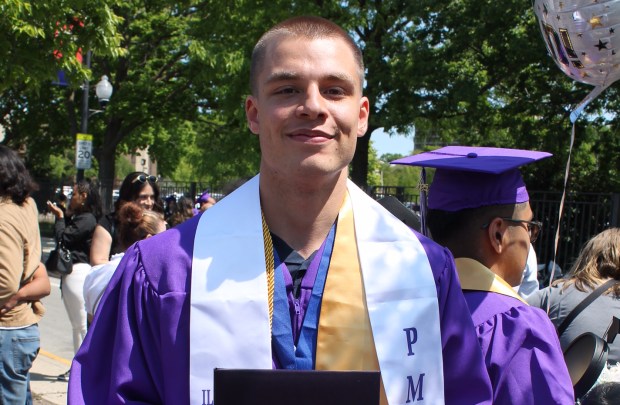A longtime British soap star until she was unceremoniously sacked in 1981, Noele “Nolly” Gordon was the kind of larger-than-life figure who is common — essential, even — to show business. A bit ridiculous, a bit imperious, but also so much fun. The final stretch of her career is brought to life by Helena Bonham Carter in “Nolly,” the three-part biopic that aired last year in the UK and comes to the U.S. courtesy of Masterpiece on PBS.
For nearly two decades, she anchored the underfunded soap opera “Crossroads,” which was set in and around a motel in the British Midlands. A running joke has one person or another pointing out how odd this premise is, considering there are no motels in England (not in the American sense of the word, anyway). The show ran from 1964 to 1988 and everything about it is a bit camp in hindsight, from the cardboard-looking sets to the stiff acting to the shabby, faded color palette. This homage — to both the show and the way Gordon carried it on her back — is from Russell T. Davies (best known for the “Doctor Who” revival) and it has a winking spirit, while also being a moving portrait of Nolly herself.
Compared to old clips that are floating around, there’s slightly more of an edge to Carter’s interpretation. The real Nolly had softer features, whereas Carter has the kind of high cheekbones that can slice through a scene. This gives her a slightly different vibe overall, but it’s a minor point. The performance is funny and affecting, and it works like gangbusters.
Nolly may be a handful, but she’s no phony and she cares a great deal about the people she works with and the job at hand. But she can be exasperating and Davies captures this with a sly sense of humor. When a new actor joins the show, Nolly objects to her regional accent. Nolly thinks everyone should be using the more pristine-sounding received pronunciation, aka RP.
But the character had a rough upbringing, someone explains.
Nolly is having none of it: “I was practically brought up single-handed. My mother worked night and day, god bless her soul, and I haven’t got a hint of Scottish Presbyterian, not a spec, not a vowel, not a single glottal stop.” Carter’s emphasis on “glottal” is a thing of perfection.
But Nolly isn’t done. She turns to her best friend and co-star Tony Adams, played by Augustus Prew: Look at Adams, she says. “Brought up on a fishing boat. His mother had an affair with the deputy manager of a coal mine.”
“She said I was conceived in a boathouse on a coil of rope!” he adds.
“And yet he ended up cut glass,” Nolly says and turns back to the new actress: “Can you do RP? Are you trained? What do you think? Can you do it?” It doesn’t matter what the show’s director (Con O’Neill) wants. As far as Nolly is concerned, she knows best. “I am making this show better if I have to haul it out of the grave line by line.” She’s been at this long enough that her instincts are probably right more often than not.
Regardless, the men who employ her are fed up and decide to show her who’s boss. Her contract is not renewed and she’s abruptly informed her character would be killed off. With so much mutual animosity in the air, she suspects their revenge will be a “cheap and tacky and pathetic” fictional death. She’s not wrong to be worried. The network boss glibly tells a reporter: “It could be an explosion. The Concorde could fall out of the sky and land on her head. She could be hit by a bus or swallowed by a whale.”
Nolly and her co-stars (who adore her and see her as a maternal figure) are as swept up in the suspense about her on-screen fate as the audience presumably was. But the process is humiliating and heartbreaking, as she reaps some of what she has sown. “I’m just an old soap star who has been sacked,” she tells her sympathetic old friend and fellow actor Larry Grayson (Mark Gatiss). They sigh and decide they’re just “two old stars bellowing into the night,” and it’s such a wonderfully poignant moment. She will reinvent herself with a career on stage, to some middle-range success. And there’s a lovely coda that allows her to close out her relationship with “Crossroads” on better terms.
For U.S. viewers, Carter’s performance has the benefit of not competing with a memory. But according to Davies, “A lot of people in Britain haven’t heard of her” either. That’s the undercurrent here. Fame is fleeting. Time passes and you’re relegated to obscurity, no matter how indelible you once were. As streaming has replaced reruns, our collective pop cultural literacy has taken a hit. We’ve become increasingly siloed off from the past, losing all those wonderfully passive opportunities that once meant it was easy to stumble across decades-old ephemera.
This shift means a project like “Nolly” can not rely on familiarity and shortcuts to see it through. It has to work even if you have no frame of reference — no knowledge of this prima donna or soaps from the era. And yet it is so well written, so well cast and executed, it finds a way to thrillingly reanimate a slice of British pop culture history from the analog era. It may be a romanticized look back, but it’s an endearing and meaningful one all the same.
“Nolly” — 3 stars (out of 4)
Where to watch: 8 p.m. Sunday on Masterpiece on PBS
Nina Metz is a Tribune critic.



